The Slovak Republic (Slovakia) is a state in central Europe with a territory of 49,000 square kilometers and a population of 5.5 million people. Throughout its history, its territory has been part of many major powers or states. In the last decades it was part of Czechoslovakia, and only in 1993 became a separate state.
This is what the modern flag of Slovakia looks like:

History of the flag
To one of the first existing Slovak characters, we can mention the information about the Nitrana Duchy (970) and independent possessions of Slovak feudal lords Omodei and Matúš Čák (first quarter of the 14th century). In general, the territory of Slovakia, since the second millennium A.D., was first part of the Kingdom of Hungary, and afterwards was part of the Austro-Hungarian Empire.
During the reign of Hungarian King Béla III, the Slovaks used a flag in the form of a white double cross on a red field.

According to historical information from the IX century this type of cross was used in Byzantium and was called — the patriarchal cross. The same cross is depicted on the modern symbol of the country.

During the reign of King Bela IV and in subsequent centuries, up to the 9th century, the Slovak flag had a red and white cloth.

During the revolutionary events of 1848-1849 Slovaks rose against Hungary. The rebelling people were also helped by the Russian army, which was sent by Nicholas I. At first the rebels used the red and white flag. Then a blue stripe was added between them, like the Russian and Croatian symbols. One inscription was made on each stripe:
- Fraternity and Concord;
- For the king and the Slovak nation;
- Glory to all the Slovaks!

In 1918, Czechoslovakia was created, the symbol of which remained a white and red cloth of the Kingdom of Bohemia.

As a result of discussions in 1920, a blue triangle was added to the flag, depicted at the stem, which represented Slovakia, as its coat of arms features a blue mountain. This created the flag of Czechoslovakia, which is also used by modern-day Bohemia.

In 1919, the Slovak Republic of Soviets was created with a variant of the banner, but history gave it a period of only 22 days (from June 16 to July 7).

The fall of Czechoslovakia in 1939 was exploited by the Slovaks, who, in cooperation with Germany, established the Slovak Republic, which lasted until the end of
the war. At that time, its symbol was a white, blue and red cloth. After 1945 Czechoslovakia was restored and at the same time its old symbol was approved.

After the «Velvet Revolution» in 1990, the Slovaks restored a version of the 1939-1945 symbol, but as a distinguishing feature from other similar symbols, they added the country’s coat of arms to it. This was decided in September 1992.
In the original version of the flag, the location of the coat of arms was centered horizontally as well, but in 1993 the law was changed, according to which the coat of arms was shifted from the center to the side of the staff.
Description
The official symbol of the Republic is in the form of a rectangular cloth with the proportions of the sides equal to 2 to 3. It is divided into three horizontal colored sectors of equal width. The sequence of their arrangement is as follows:
- the top is white;
- in the center is blue;
- The bottom is red.
The coat of arms of Slovakia, depicted on the cloth, is centered vertically, and horizontally shifted toward the stem by 1/3 of the flag’s length.
Flag colors
The national symbol of the Republic has three colors: white, blue and red.
Meaning of colors and flag symbol
The colors used on the official symbol of Slovakia have the following interpretation:
- white — nobility,
- blue — freedom,
- red — spilled blood.
The three hills depicted on the coat of arms point to the mountains, which are named Tatry, Fatry and Matry. The symbolism of the mountains for Slovaks is that since ancient times they have served both as shelter from enemies and as protection from bad weather. Their imagery has been sung in legends and tales. They are also sung in the verses of the national anthem.
The meaning of the colors used, is the harmony and independence of the Slavic peoples.
Other Flags
Among the state structures and institutions of Slovakia, which have their own symbols can be distinguished:
- Standard of the President;
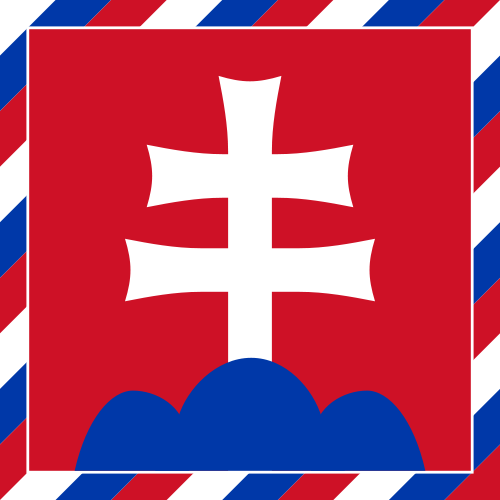
- Department of Defense;

- Armed Forces;

- Air Force.
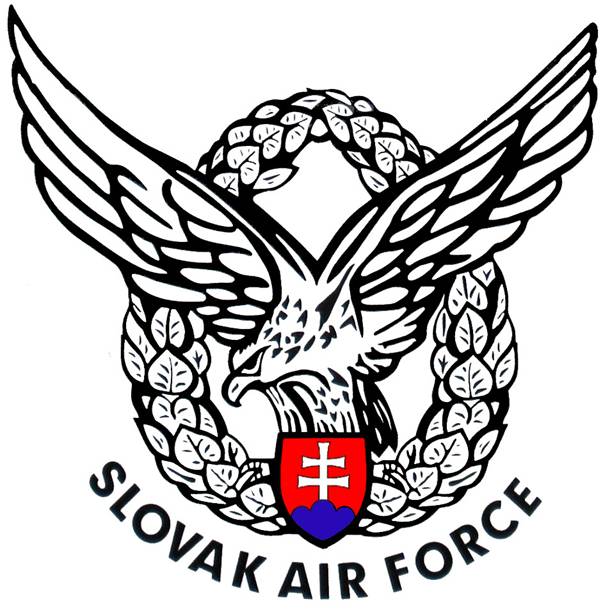
In 1939-45 the Standard of the President looked different
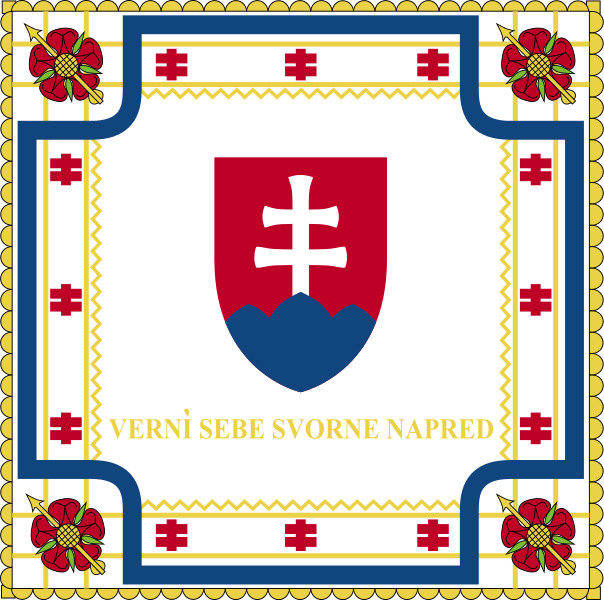
Similar flags
The colors used on a country’s flag are used by many nations, but there are only two flags in the sequence in which they are placed in this case:
- Russian flag:
- Slovenian flag:

Interesting facts about the flag
The coat of arms on the SR flag is similar to the Hungarian one, but has some differences. Three hills (mountains), on top of which is a six-pointed cross, are left as a reminder of events and history when Slovakia was part of Hungary, where the same mountains are depicted in green. At the first time after the creation of the Slovak state (1992), the Hungarians tried to challenge the version with the hills on the symbols of Slovakia, since one mountain was on the territory of Hungary, but later they came to a civilized agreement.
General information about Slovakia
| Official language | Slovak |
| Capital | Bratislava |
| Territory | 49,034 km² |
| Population | 5,455,030 people |
| Currency | euro (EUR) |
| Phone Code | +421 |

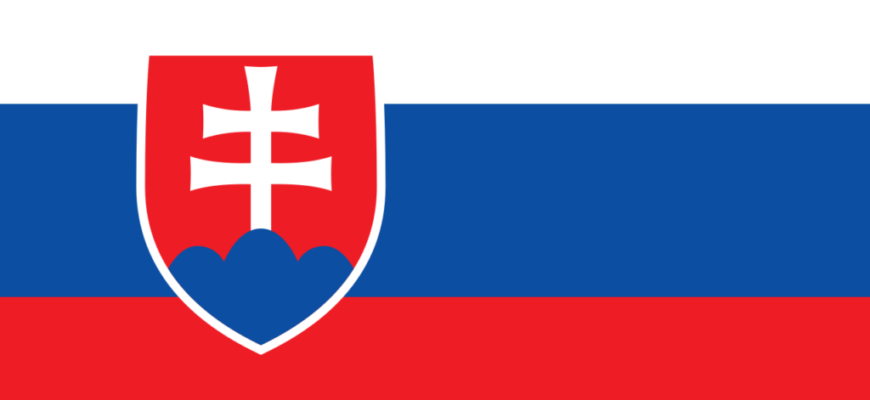





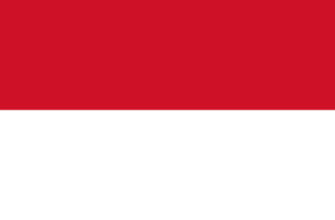
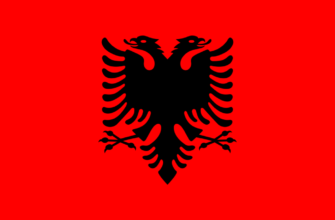
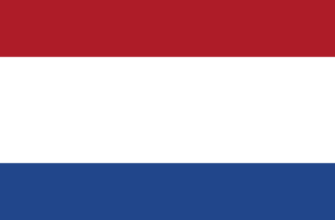
Как женщина, представительница Словакии, хочу отметить, что флаг нашей страны — это не просто ткань с цветами. Это символ нашей истории, культуры и единства. ТриHorizontal полосы: белая, синяя и красная — это отражение наших традиций и стремлений. Герб на флаге напоминает нам о нашем наследии и важности защиты нашей независимости. Важно гордиться своим флагом и передавать его значение новым поколениям!
Как мужчина, я полностью согласен. Когда я был в Словакии, увидел, как люди с уважением относятся к флагу — это действительно объединяет. В моем родном городе тоже есть символы, которые напоминают нам о нашей истории и вдохновляют держаться вместе.
I once visited Slovakia and saw their beautiful flag waving proudly. It reminded me of the friendly locals and the rich history of the country. I’m grateful for that trip; it really opened my eyes to different cultures. Slovakia is a gem worth exploring!
I remember when I visited Slovakia, and I saw the national flag everywhere—it was so vibrant! I learned that each color represents something special about the country’s history. Climbing up to see the flag flying high on the castle was unforgettable. It really made me feel connected to the culture!
Oh wow, the flag of Slovakia is so cool! I remember when I visited and saw it flying everywhere. It made me feel connected to the history and culture. That combo of colors is just stunning! Can’t wait to learn more about its meaning!
As someone who visited Slovakia last year, I found the flag super meaningful. The double cross and three hills really tell a story about the country’s history and geography. It’s cool how a flag can capture so much pride and identity in just a few colors and shapes.
As a guy who loves hiking in Slovakia, I always spot the flag flying proudly on mountain peaks. It’s amazing how those white, blue, and red colors symbolize freedom and tradition. Once, during a trek, locals explained the flag’s history—it made my trip even more meaningful!
As a guy named Donald, I gotta say, the Slovak flag’s design is pretty slick! Seeing those vibrant colors and the double cross reminds me of the time I visited Slovakia and got to admire their rich history firsthand. Truly awesome vibes from that flag!
As a guy who loves history, I once got totally fascinated by Slovakia’s flag during a trip there. The colors and double cross made me dig into its meaning, and that little adventure made me appreciate their culture way more! Flags really tell cool stories, huh?
As a guy who’s traveled through Eastern Europe, I remember seeing Slovakia’s flag everywhere. The double cross on the flag always caught my eye—it’s a real symbol of their rich history. Definitely cool how flags tell stories about countries you visit. Makes travel way more interesting!
I once visited Slovakia and saw the flag flying high everywhere. It felt great to be surrounded by such pride. The colors and symbols tell a cool story about their history. Made me appreciate how a flag can really bring people together. Definitely a memorable trip!